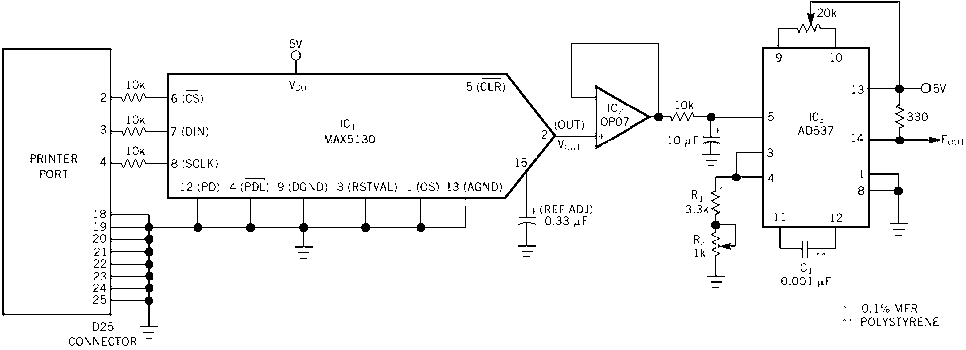| 电路设计 单片机学习 PCB设计 电子制作 电工基础 电路基础 电子电路图 电脑技术 维修教程 手机数码 家电维修 电力技术 电气技术 |
| 电子基础 arm嵌入式 集成电路 模拟电子 电源管理 显示光电 楼宇控制 安防监控 控制电路 音响功放 单元电路 电子下载 维修资料下载 |

#include<stdio.h>
#include<conio.h>
#include<math.h>
#include<bios.h>
#include<dos.h>
#define CLK1 0x04 /* Clock Pulse High*/
#define CLK0 0xfb /* Clock Pulse Low*/
#define CS10x01 /* Chip Select high to deactivate DAC*/
#define CS0 0xfe /* Chip Select low to activate DAC*/
#define DATA1 0x02 /* Data Pulse High*/
#define DATA0 0xfd /* Data Pulse low*/
int c[16],dport,ACTUALDATA,out,k;/*Global Declarations*/
float VOUT;/*DAC OUTPUT-p.htm" target="_blank" title="OUTPUT货源和PDF资料">OUTPUT*/
void d2b(unsigned int x, int*c)/*Routine for Decimal to Binary Conversion*/
{
int i;
for(i=0;i<=15;i )
*(c )=(x>>i) & 0x1;
}
float ftov()/*Hertz to DAC output Conversion Routine*/
{
int HERTZ;
printf("\n \nEnter the frequencywithin 0 to 10000Hz:");
scanf("%d",&HERTZ);
VOUT=0.00040955*HERTZ;
printf("\n VOUT=%f\n",VOUT);
return VOUT;
}
void CLOCK_DAC(void)/*Routine for clocking the DAC*/
{
out|=CLK1;
outportb(dport,out);/*Setting the clock high*/
delay(1);
out&=CLK0;
outportb(dport,out);/*Setting the clock low*/
delay(1);
}
void LOAD_DACDATA(int*c)/*Routine for loading actual data into the DAC*/
{
out|=CS1;
outportb(dport,out);/*Chip Select high to disable DAC*/
delay(1);
out&=CS0;
outportb(dport,out);/*Chip Select low to enable DAC*/
delay(1);
printf("\nDATA loaded into the DAC=");
for(k=15;k>=0;k--)
{
out|=c[k];
outportb(dport,out);
printf("%d",c[k]);
delay(1);
CLOCK_DAC();
}
out|=CS1;
outportb(dport,out);
delay(1);
}
main()
{
int v,inc;
float y;
unsignedint x;
double fraction, integer, number;
clrscr();
printf("\tUse Your Printer Port as a Programmable Frequency Generator");
printf("\n\t\t\t by\n");
printf("\tK.Suresh,MSD,IGCAR,Kalpakkam,TamilNadu-603102,India");
dport= peek(0x40,8);/*Check up for availability of Printer Port*/
if (dport==0)
{
printf("\n\n LPT NOT AVIAILABLE! EXITING........");
exit(1);
}
printf("\n\nAddress of the printer port found =0x%X",dport);
ftov();
y=(VOUT*8192)/(2.5*1.6384);
v=y/1;
number=y;
fraction = modf(number, &integer);
if (fraction<0.44)
inc=0;
else inc=1;
ACTUALDATA=16384 v inc; /*Actual data including the Control Word for DAC*/
d2b(ACTUALDATA,c);
LOAD_DACDATA(c);
return 0;
}
如果觉得 用打印机端口做可编程频率发生器电路这篇文章不错,可以推荐给朋友分享哦。 温馨提示; 本站的资料全部免费下载,为方便下次找到本站记得将本站加入收藏夹哦,牢记网址http://www.dianzi6.com
温馨提示; 本站的资料全部免费下载,为方便下次找到本站记得将本站加入收藏夹哦,牢记网址http://www.dianzi6.com|
此页提供用打印机端口做可编程频率发生器电路电路设计, 家电维修 - 单元电路介绍 - 微机|单片机参考。本站还有更多的微机|单片机相关资料分享。
Copyright© www.dianzi6.com Inc. All rights reserved 。 1 2 3 4 5 6 7 8 |
|